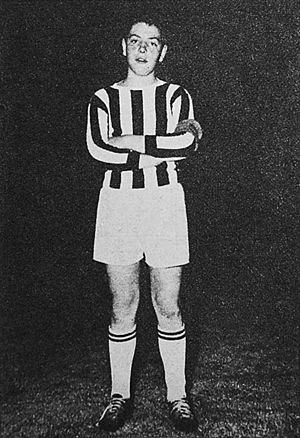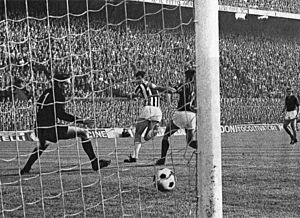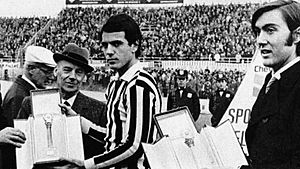Roberto Bettega facts for kids
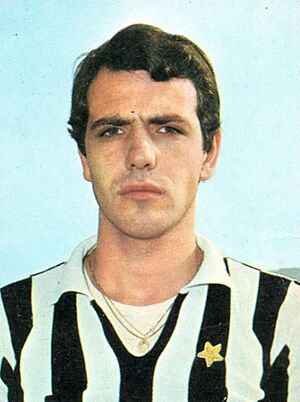
Bettega with Juventus in 1971
|
|||
| Personal information | |||
|---|---|---|---|
| Full name | Roberto Bettega | ||
| Date of birth | 27 December 1950 | ||
| Place of birth | Turin, Italy | ||
| Height | 1.84 m (6 ft 0 in) | ||
| Position(s) | Forward | ||
| Youth career | |||
| Juventus | |||
| Senior career* | |||
| Years | Team | Apps | (Gls) |
| 1969–1983 | Juventus | 326 | (129) |
| 1969–1970 | → Varese (loan) | 30 | (13) |
| 1983–1984 | Toronto Blizzard | 48 | (11) |
| Total | 404 | (153) | |
| International career | |||
| 1975–1983 | Italy | 42 | (19) |
| *Club domestic league appearances and goals | |||
Roberto Bettega (born 27 December 1950) is a famous Italian former footballer. He played as a forward, which means he was usually trying to score goals.
Roberto Bettega is best known for his amazing time playing for his hometown club, Juventus. He won many important titles there. People remember him as one of Italy's greatest players ever. He was strong, skilled, great at scoring goals, and very creative on the field. Fans called him La penna bianca ("White Feather") because of how he looked, and Bobby Gol! because he scored so many goals.
He also played for the Italian national team. He helped Italy finish fourth in the 1978 FIFA World Cup and the 1980 European Championships. Sadly, he couldn't play in the 1982 World Cup because of an injury, but Italy went on to win that tournament!
After his playing career, Bettega worked for Juventus again. In December 2009, he became a deputy director-general. This meant he helped connect the players and coaches with the club's leaders. He also helped with player transfers. He left this role in 2010.
Contents
Club Career: Roberto Bettega's Football Journey
Early Days: Starting with Juventus and Varese
Roberto Bettega was born in Turin, Italy. He joined the Juventus youth team in 1961 when he was just 11 years old. He started as a midfielder.
In 1969, when he was 19, Juventus loaned him to Varese F.C., a team in Serie B (Italy's second division). Under coach Nils Liedholm, Bettega scored 13 goals. This helped Varese win the league and get promoted to Serie A (Italy's top division).
Nils Liedholm said that Bettega was very strong and had great skills. He was good at heading the ball and could kick with both feet. Liedholm believed Bettega would become a fantastic player with more experience.
Professional Success: Becoming a Juventus Star
Bettega returned to Juventus and made his Serie A debut on 27 September 1970. He scored the winning goal in that match! He finished his first season with 13 goals in 28 games. The next season, he scored 10 goals in only 14 games.
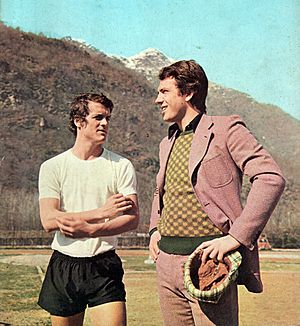
In 1972, Bettega scored a goal against Fiorentina. But soon after, he had to stop playing because of a serious lung infection. Even though he was out, Juventus still won the Serie A title that season. He recovered quickly and returned to play in September 1972. He then helped Juventus win their second straight league title.
When Giovanni Trapattoni became coach in 1976, Bettega became the main forward for Juventus. He played alongside Roberto Boninsegna. Together, they led the team to huge success. They won two Serie A titles in a row, the Coppa Italia (Italian Cup), and the UEFA Cup. Juventus also reached the European Cup final in 1973.
Bettega won another Serie A title with Juventus in the 1980–81 season. However, he didn't play much in the 1981–82 season when Juventus won the league again. This was because he hurt his knee during a European Cup match in 1981.
After recovering, he played his final season with Juventus in 1982–83. He stopped playing in Europe after Juventus lost the 1983 European Cup Final to Hamburg.
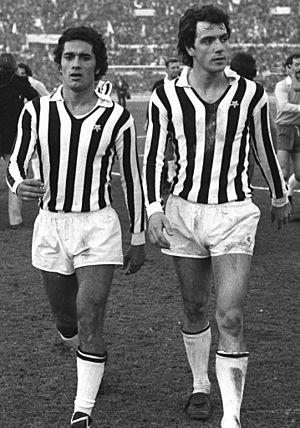
Overall, Bettega played 326 league games for Juventus and scored 129 league goals. He had a very successful career, winning seven league titles between 1972 and 1982. He also won the UEFA Cup in 1977 and the Coppa Italia in 1979. He was the top scorer in Serie A in the 1979–80 season. Roberto Bettega scored 179 goals for Juventus in all competitions.
After leaving European football, Bettega played two summers in the NASL for the Toronto Blizzard. He helped them finish second in the league twice.
International Career: Playing for Italy
Roberto Bettega played 42 games for the Italian national team and scored 19 goals. His first call-up was in 1975.
He played in the 1978 FIFA World Cup and scored two goals. Italy reached the second round but lost to the Netherlands, missing out on the final. Italy finished fourth after losing to Brazil in the third-place play-off. Bettega was even chosen for the "Team of the Tournament" because he played so well.
Bettega also helped Italy finish fourth at the 1980 European Championship, which was held in Italy.
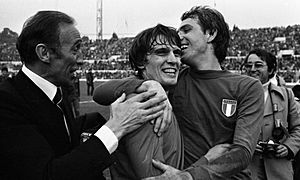
He was supposed to play for Italy in the 1982 FIFA World Cup. However, he suffered a knee injury during a European Cup match in 1981. This meant he missed the tournament, which Italy famously won!
Style of Play: How Roberto Bettega Played
Bettega was known for being a very smart player on the field. In his best years, he was one of the most feared Italian strikers. This was because he was physically strong and scored many goals.
He was tall, fast, agile, and athletic. Bettega was excellent at heading the ball and was known for scoring amazing acrobatic goals. He was good at getting into the right position for crosses and was a very accurate scorer with both feet. His elegant style, strength in the air, and hair that turned grey early earned him another nickname: Cabeza Blanca ("white head" in Spanish).
Many people think Bettega is one of the greatest Italian footballers ever. He was a complete team player who could play in different positions. He had great stamina, vision, and passing skills. He also had amazing technical abilities, which made some compare him to Juventus legend John Charles.
Early in his career, he usually played as a centre-forward. Later, he also played as a left winger or even in a more creative role, like a supporting striker or attacking midfielder. This happened especially after he lost some of his speed. Besides his skills, Bettega was also known for his strong personality, determination, and leadership. Even though he was a great player, his career was affected by injuries, especially later on.
After Retirement: Roberto Bettega's Return to Juventus
After he stopped playing football, Roberto Bettega returned to Juventus. The club's chairman, Umberto Agnelli, asked him to be the vice-chairman of the board of directors. He held this position from 1994 to 2006.
He came back to Juventus again in 2009 as a vice general manager. However, this return was short. He left in 2010 after Andrea Agnelli became chairman and Giuseppe Marotta became CEO.
Personal Life: Roberto Bettega's Family
Roberto Bettega has a son named Alessandro. Alessandro also started his football career in the Juventus youth system. He was even the captain of the Primavera (youth) team.
Honours: Roberto Bettega's Trophies and Awards
Juventus
- Serie A: 1971–72, 1972–73, 1974–75, 1976–77, 1977–78, 1980–81, 1981–82
- Coppa Italia: 1978–79
- UEFA Cup: 1976–77
- Intercontinental Cup runner-up: 1973
- European Cup runner-up: 1972–73, 1982–83
- Inter-Cities Fairs Cup runner-up: 1970-71
Varese
- Serie B: 1969–70
Italy
- FIFA World Cup semi-finals: 1978
- UEFA European Championship semi-finals: 1980
Individual
- Serie A top scorer: 1979–80
- Serie B top scorer: 1969–70
- FIFA World Cup All-star Team: 1978
- World Soccer XI: 1978
See also
 In Spanish: Roberto Bettega para niños
In Spanish: Roberto Bettega para niños
 | Leon Lynch |
 | Milton P. Webster |
 | Ferdinand Smith |


